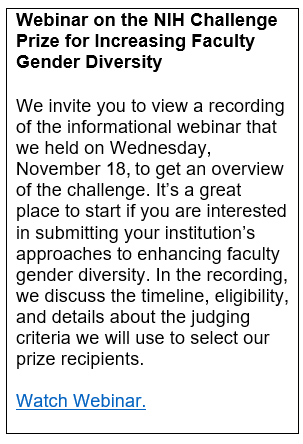NIH Launches Challenge Prize to Help Address Gender Diversity and Equity Problems Faced by Faculty in Higher Education
By Dr. Janine A. Clayton
 I am pleased to announce that the National Institutes of Health (NIH) Office of Research on Women’s Health (ORWH) has launched a new Challenge Prize competition to promote the advancement of women in leadership roles in higher education.
I am pleased to announce that the National Institutes of Health (NIH) Office of Research on Women’s Health (ORWH) has launched a new Challenge Prize competition to promote the advancement of women in leadership roles in higher education.
Named the Enhancing Faculty Gender Diversity in Biomedical and Behavioral Science Prize, it will recognize institutions that have successfully and systemically addressed gender diversity and equity issues among faculty members in biomedical and behavioral sciences. Its aim is not only to increase gender diversity in these fields, but also to promote the broad dissemination and adoption of replicable, evidence-based institutional approaches to promoting gender diversity.
Advancing women into leadership roles in the sciences is critical to producing good science. Diversity in the scientific workplace generates more innovative solutions; diverse teams are more productive and produce more substantial research. Additionally, women scientists in senior and leadership roles are more likely to study the effects of sex on health and disease, which is essential to increasing the rigor and reproducibility of biomedical research.
In the United States, women enter graduate studies in the life sciences at about the same rate as men. It is after their studies that women’s advancement runs into the steepest barriers. For example, in biomedical sciences, women are underrepresented at the faculty level, particularly in mid- and senior-level positions. Similarly, women account for less than 20% of medical school deans and department chairs, despite comprising roughly half of medical school students.

The coronavirus pandemic has added challenges for women in scientific research, increasing the potential value of the information shared via the Challenge Prize.
The creation of the prize reflects and furthers ORWH’s work over the past 30 years in advancing women in biomedical careers. It also is a part of the work of the NIH Working Group on Women in Biomedical Careers—which is co-chaired by NIH Director Francis S. Collins, M.D., Ph.D., and me, as ORWH Director—in coordinating and leading various efforts across NIH to address the underrepresentation of women in biomedical careers. Moreover, the prize advances the Trans-NIH Strategic Plan for Women’s Health Research—in particular, Strategic Goal 4, which states: “Promote training and careers to develop a well-trained, diverse, and robust workforce to advance science for the health of women.”
Assisting NIH in the collection and aggregation of evidence-based practices from institutions across the country will be HeroX, a firm specializing in crowdsourcing solutions. The nonprofit organization Base 11 will manage institution engagement.
About the Prize: Eligibility for the prize competition is limited to U.S.-based accredited public or private nonprofit academic institutions that grant baccalaureate or advanced degrees in biomedical, behavioral, or health sciences. Up to 10 institutions will be awarded a prize of up to $50,000 each. Submissions to this prize competition will inform the development of a toolkit for wide dissemination of best practices, lessons learned, and transformative strategies and approaches.
How to Enter: To learn more about the prize, visit https://www.challenge.gov/challenge/nih-prize-for-enhancing-faculty-gender-diversity.
